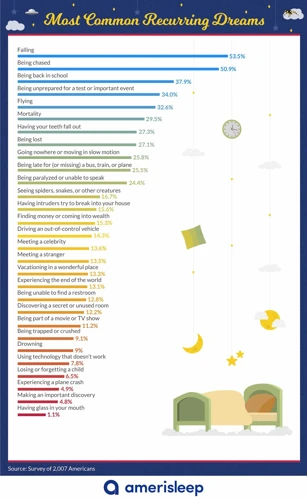Have you ever found yourself waking up in the morning, feeling confused and unsettled by a dream that seems to occur frequently? Do you wonder why certain images or scenarios seem to haunt your subconscious repeatedly? Recurring dreams have puzzled people for centuries, and despite our advancements in scientific understanding, they remain a mystery. In this article, we will delve into the significance of recurring dreams and explore the possible explanations for their occurrence. Join us on this journey as we unlock the secrets of the dreaming mind and uncover the keys to interpreting these enigmatic visions.
What are Recurring Dreams?

Have you ever had a dream that kept coming back, haunting you night after night, leaving you with a sense of unease or curiosity? These are known as recurring dreams, and they are more common than you may think. Recurring dreams are a perplexing phenomenon that can leave us wondering why we keep having the same dream over and over again. In this section, we will delve deeper into the definition of recurring dreams, as well as explore the science behind them.
Definition of Recurring Dreams
Recurring dreams are a type of dream that is continuously experienced by an individual. These dreams often have a similar storyline or theme that repeats itself, typically with minimal variations. According to psychologists, recurring dreams may indicate a significant issue that an individual is facing in their waking life that they are struggling to resolve.
Here is a table that defines the characteristics of recurring dreams:
| Characteristics | Explanation |
|---|---|
| Repeated Occurrence | This type of dream occurs multiple times, usually more than three. |
| Similar Storyline/Theme | The dream is characterized by a consistent theme or storyline, often with little variation between instances. |
| Memorable Elements | Recurring dreams often involve details or elements that are difficult to forget. |
| Emotional Impact | These dreams are often associated with strong emotions, such as anxiety, fear, or confusion. |
| Difficulty Remembering | While memorable elements are part of recurring dreams, the actual events of the dream may be hard to recall. |
Recurring dreams can be a source of frustration or even distress for individuals. However, it is essential to recognize that they may have hidden meanings that can provide insight into an individual’s thought processes, emotions, and subconscious mind. Interpreting recurring dreams can provide a path to better understanding oneself and resolving underlying issues.
The Science behind Recurring Dreams
Many scientists have been trying to unravel the scientific explanation for recurring dreams. It is a widely debated topic that has resulted in many theories. In this section, we will explore some of the most popular theories and their explanations.
| Theory | Explanation |
|---|---|
| Memory Consolidation Theory | This theory suggests that recurring dreams are a result of the brain’s attempt to consolidate important memories from our daily lives. The brain replays these memories during REM sleep as a way of strengthening synaptic connections in the brain. |
| Threat Simulation Theory | This theory suggests that recurring dreams, particularly nightmares, are a way for our brains to prepare for threatening situations. The repetition of these dreams allows us to rehearse responses to threats that we may encounter in our waking lives. |
| Emotional Regulation Theory | This theory suggests that recurring dreams are a way for our brains to regulate and process strong emotions. Our brains use these dreams as an opportunity to work through difficult emotions that we may be struggling with in our daily lives. |
| Unfinished Business Theory | This theory suggests that recurring dreams are a result of unresolved issues or unfinished business in our waking lives. These dreams are our brain’s way of alerting us to these unresolved issues and urging us to take action to address them. |
| Neurological Dysfunction Theory | This theory suggests that recurring dreams may be a result of neurological dysfunction. The brain’s inability to process and integrate information properly may result in the repetition of certain dream elements or themes. |
While none of these theories provide a definitive explanation for recurring dreams, they do offer some insight into why they occur. Perhaps a combination of these theories could bring us closer to understanding the mysteries behind recurring dreams.
Why do We Have Recurring Dreams?

As we dive deeper into the realm of recurring dreams, we can’t help but wonder about the motives behind their existence. The idea of having the same dream repeatedly can be perplexing and may leave us questioning its significance. However, psychologists and spiritualists have devoted years of research to uncovering the reasons why we experience recurring dreams. Here, we will explore the possible explanations behind their occurrence and gain a better understanding of their overall purpose.
Psychological Explanations
One possible way to write this section with a table is:
| Psychological Explanation | Description |
|---|---|
| Unresolved Trauma | Some psychologists believe that recurring dreams may be a manifestation of unresolved trauma or anxiety, which the dreamer has not dealt with effectively in waking life. These dreams may trigger similar emotions and physical sensations as the original event and serve as a way to process or cope with the unresolved feelings. |
| Unconscious Desires | Another theory is that recurring dreams reflect unconscious desires and conflicts, especially those related to early childhood experiences, relationships, or identity. These dreams may reveal important insights about the dreamer’s true self, wants, and fears, and may help them resolve internal conflicts and live more authentically. |
| Repetitive Patterns | Some researchers argue that recurring dreams are simply a result of the brain’s tendency to create patterns and connections, which can sometimes cause repetitive dreams that have no deeper meaning or message. According to this view, these dreams may be more common in people who have vivid imaginations or anxiety disorders, but they do not necessarily reflect any specific psychological issue. |
As you can see, there are different psychological explanations for recurring dreams, and each one offers a unique perspective on why and how they occur. These explanations suggest that recurring dreams are not random or meaningless, but rather reflect some aspect of the dreamer’s psyche that requires attention and understanding. By exploring the possible meanings of these dreams and interpreting them in the context of the dreamer’s life, it may be possible to gain new insights and make positive changes in one’s waking life.
Spiritual Explanations
According to many spiritual beliefs, including Hinduism and Buddhism, recurring dreams can be attributed to a deeper spiritual meaning beyond just psychological factors. In these belief systems, dreams are seen as a significant part of spiritual growth and enlightenment, and can offer guidance and insight into one’s life journey.
Dream Messages from the Universe
Some spiritual beliefs assert that recurring dreams carry messages from the universe, spirit guides or higher power. The universe is believed to communicate through symbolism and metaphor, which can be interpreted to provide direction or insight. For instance, recurring dreams of water may represent the ebb and flow of life, while recurring dreams of flying may symbolize one’s desire for freedom or adventure.
Karmic Energy
In Hinduism and Buddhism, it is believed that recurring dreams may be a result of one’s karmic energy. Karma is the idea that our actions, thoughts and emotions create an energetic pattern or imprint that returns to us in future lives, or in this life. Recurring dreams that reflect a negative karmic pattern may be an opportunity to become aware of and heal past traumas or patterns.
Messages from Deceased Loved Ones
In some spiritual beliefs, it is believed that deceased loved ones may communicate with us through recurring dreams. These dreams may offer comfort, guidance, or a chance to resolve unfinished business. It is believed that deceased loved ones may choose to communicate through dreams because dreams offer a more open and receptive state of mind.
Interpreting Spiritual Meanings
Interpreting recurring dreams from a spiritual perspective requires an open mind and a willingness to explore deeper meanings. Keeping a dream journal and recording any emotions, symbols or metaphors that stand out can be helpful for uncovering spiritual interpretations. Seeking the guidance of a spiritual mentor, such as a shaman or spiritual counselor, can also offer insight and support in interpreting recurring dreams from a spiritual perspective.
| Belief System | Interpretation of Recurring Dreams |
|---|---|
| Hinduism | Recurring dreams may be a result of one’s karmic energy, offering insight into past traumas or patterns. |
| Buddhism | Recurring dreams may provide guidance and insight into one’s life journey, and may offer an opportunity for spiritual growth and enlightenment. |
| Universal Spiritual Beliefs | Recurring dreams may carry messages from the universe or higher power, communicating through symbolism and metaphor. |
| Spiritualism | Recurring dreams may be a way for deceased loved ones to communicate with us, offering guidance, comfort, or a chance to resolve unfinished business. |
Types of Recurring Dreams

As we delve deeper into the world of recurring dreams, we come across various types that leave us perplexed and yearning for answers. These dreams can be distressing, fascinating, or puzzling, and understanding their significance is crucial to unlocking their underlying meanings. Through this section, we will explore the different types of recurring dreams, the emotions they evoke, and how to interpret them to unravel the mysteries buried within. So, let’s take a closer look and uncover the hidden symbols and messages in these enigmatic dreams.
Nightmares
Nightmares are a type of recurring dream that can be particularly distressing, often causing a person to wake up feeling frightened or anxious. Nightmares can vary in content and severity, but they typically involve threats to a person’s safety or well-being.
According to research, nightmares serve an important function in helping individuals process difficult emotions and experiences. They provide a way for the brain to process and work through emotions related to trauma or stressful events. However, frequent and severe nightmares can also indicate underlying mental health issues, such as anxiety, depression, or PTSD.
Table:
Nightmares A type of recurring dream Causes feelings of fear and anxiety upon waking Content Usually involves threats to safety or well-being Function Helps process difficult emotions and experiences Mental Health Frequent and severe nightmares can indicate underlying mental health issues such as anxiety or PTSDTo interpret nightmares and their recurring nature, it may be helpful to keep a dream journal and identify any common themes or symbols. It may also be helpful to speak with a mental health professional if the nightmares are causing significant distress or interfering with daily functioning.
Lifelong Dreams
One type of recurring dreams that people may experience is lifelong dreams. These are dreams that may have been present in a person’s life for as long as they can remember. They are often vivid and may feel like they hold great personal significance.
Some examples of lifelong dreams may include dreaming of a specific place or person, or having a recurring dream theme such as flying or falling. These dreams may have started in childhood and continued into adulthood, or they may have developed later in life.
It is important to note that lifelong dreams may have both personal and symbolic meanings. For example, dreaming about a childhood home may represent a desire to return to a simpler time or a need for comfort and security. Alternatively, dreaming of a particular person may represent a longing for connection or a sense of loss.
Interpreting lifelong dreams may require deep introspection and a willingness to explore one’s emotions and experiences. Keeping a dream journal and identifying common elements in these dreams can also be helpful in unlocking their significance.
While lifelong dreams can be meaningful and provide insight into a person’s psyche, they can also become distressing if they are accompanied by negative emotions or interfere with daily life. In such cases, it may be helpful to seek the guidance of a mental health professional.
Recurring Theme Dreams
Recurring theme dreams are those dreams that revolve around a particular theme, feeling or situation. These types of dreams are quite common and can be insightful in uncovering one’s subconscious thoughts and emotions. The themes can range from feeling lost or being chased, to being stuck in a certain place or reliving a particular event.
The recurrence of the theme is what sets these dreams apart from regular dreams. It’s important to note that these themes may not always be negative – they can also be positive, such as dreaming about flying or being surrounded by loved ones.
One possible explanation for recurring theme dreams is that they reflect our day-to-day concerns and fears. These themes may resurface in our dreams as a way of processing and dealing with these emotions. For example, if someone is feeling overwhelmed with work, they may have recurring dreams of being late or missing an important deadline.
Another possible interpretation of recurring theme dreams is that they reflect past experiences and trauma. These themes may represent unresolved issues and emotions that continue to affect us on a subconscious level. For example, someone who has experienced abandonment in their past may have recurring dreams of being left behind or abandoned.
Interpreting recurring theme dreams can be challenging as the same theme can have different meanings for different people. However, there are some common symbols and emotions that may provide a starting point for interpretation. Keeping a dream journal and looking for common elements in the dreams can also be helpful.
Here is an example of a dream journal entry for a recurring theme dream:
| Date | Theme | Emotions | Symbols |
|——|——-|———-|———|
| 5/10/21 | Lost | Helplessness, fear | Maze, dark forest, dead end |
From this entry, one can start to analyze the dream and uncover some possible interpretations. The maze and dark forest may represent feeling lost and confused, while the dead end may represent a feeling of being stuck with no way out.
Recurring theme dreams can provide valuable insights into our subconscious thoughts and emotions. By analyzing and interpreting these dreams, we can gain a deeper understanding of ourselves and our past experiences.
How to Interpret Recurring Dreams?

Unlocking the hidden meanings behind recurring dreams can feel like a daunting and perplexing task. However, understanding the significance of these persistent dreams can provide valuable insight into our inner thoughts, emotions, and experiences. By keeping a dream journal, identifying common elements, examining symbolic meanings, and considering personal interpretations, we can begin to unravel the mysteries behind our recurring dreams. In this section, we will explore some practical steps for interpreting these elusive recurring dreams, guiding you towards a deeper understanding of your unconscious mind.
Keep a Dream Journal
One of the most helpful steps in interpreting recurring dreams is keeping a dream journal. This involves writing down the details of your dreams as soon as you wake up, while they are still fresh in your mind. Here are some tips for keeping a dream journal:
- Keep a notebook and pen by your bed: Having a designated place to record your dreams will make it easier to remember to write them down.
- Write down everything you remember: Even if it seems insignificant or unrelated, write down every detail you remember from your dream. This can include emotions, people, places, and actions.
- Write in the present tense: Writing in the present tense can help you fully immerse yourself in the dream and remember the details more vividly.
- Date your entries: This will help you keep track of the frequency of your recurring dreams and whether any patterns emerge over time.
- Don’t worry about grammar or spelling: The purpose of a dream journal is to capture your subconscious thoughts and feelings, so don’t worry about making it look perfect.
By keeping a consistent dream journal, you may start to notice patterns and recurring themes in your dreams. This can be a helpful starting point for interpreting the meaning behind your recurring dreams.
Identify Common Elements
One of the methods for interpreting recurring dreams is to identify common elements that appear in each dream. These elements can provide clues to the underlying meaning of the dream.
Common Elements Table:
| Common Element | Possible Interpretation |
|---|---|
| People | Consider the roles these individuals play in your waking life, as well as your emotions toward them. |
| Locations | Think about the significance of the places you go in your dreams. Are they familiar or unknown? Do they relate to significant events in your life? |
| Objects | Pay attention to the meaning of any objects that appear in your dreams. Are they significant to you in your waking life? Do they represent something else? |
| Actions | Consider what you are doing in your dreams. Are you running away from something? Searching for something? These actions may represent your waking life actions or emotions. |
| Emotions | Take note of the emotions you feel during the dream. Do they differ from how you feel in real life? These emotions may give insight into your subconscious feelings. |
By identifying these common elements and analyzing their possible interpretations, you can begin to understand the message your subconscious is trying to communicate. It’s important to keep in mind that the interpretation of these elements can vary based on your personal experiences and emotions.
Look for Symbolic Meanings
One important way to interpret recurring dreams is to look for symbolic meanings within them. These symbolic meanings can often provide insight into your subconscious thoughts and emotions.
When looking for symbolic meanings, it’s important to consider the context of the dream and the specific symbols that appear. Try making a table with columns for the symbol, its appearance in the dream, and possible interpretations or associations.
| Symbol | Appearance in Dream | Interpretation or Association |
|——–|——————|——————————-|
| Water | River | Emotions or the unconscious |
| Spider | Weaving a Web | Creativity, entanglement |
| Flight | Flying in the Sky | Freedom, fear, escape |
Water: Water is a common symbol in dreams and can represent emotions or the unconscious. Pay attention to the qualities of the water in the dream, such as whether it is calm or turbulent, clear or murky. This can give you clues about your emotional state.
Spider: Spiders may represent creativity or entanglement, depending on the context of the dream. If the spider is weaving a web, it could symbolize your own creative process. If you feel trapped in the web, it could represent feeling stuck or entangled in a situation.
Flight: Dreaming of flight can represent feelings of freedom or fear. If you are soaring through the sky, it could represent a desire for freedom or escape from something in your waking life. If you are struggling to fly or feel like you are falling, it could represent fear or anxiety about a situation.
Remember that these interpretations are not necessarily universal and can vary based on the individual and their personal experiences and associations. It’s important to approach the dream with an open mind and consider all possible interpretations.
Consider Personal Interpretations
One important thing to remember when interpreting recurring dreams is to consider your personal interpretation. While there are commonly accepted meanings for certain symbols or themes, it’s important to also take into account how those symbols or themes make you feel and what they may specifically represent for you.
Here are some tips on how to consider your personal interpretations:
- Reflect on your personal experiences: Think about any past experiences, traumas, or relationships that may relate to the recurring dream.
- Consider your current life: What is happening in your life currently that may be causing the dream to recur?
- Pay attention to your emotions: Take note of how you feel during the dream and after waking up. What emotions are present and how do they relate to your personal life?
- Think about your own symbolism: Everyone has unique symbols that hold personal meanings to them. Consider what certain objects or people in the dream may represent to you personally.
By considering your personal interpretations, you may be able to uncover deeper layers of meaning within the recurring dream. It’s important to remember that these interpretations may differ from any widely accepted meanings, but they are no less valid. Trusting your own interpretation can lead to greater self-understanding and insight into your subconscious mind.
Common Recurring Dreams and their Interpretations

Many people across the world experience recurring dreams, which can be extremely disturbing and confusing. While some recurring dreams are unique to the individual, there are some types of recurring dreams that are commonly experienced. Understanding the meanings behind these dreams can provide insight into the individual’s waking life and unresolved psychological conflicts.
Falling Dreams: Dreaming about falling is quite common and can be a nerve-wracking experience. These dreams often represent a fear of loss of control or anxiety about change.
Flying Dreams: Flying dreams are often associated with a feeling of freedom and empowerment. They can signify overcoming obstacles or a desire to escape life’s challenges.
Naked Dreams: Dreams in which we are naked or partially clothed in public can indicate vulnerability or a fear of being exposed. These dreams may also be related to issues of self-esteem or body image.
Teeth Falling Out Dreams: Dreams about losing teeth can be particularly unsettling. They can represent anxiety about communication, powerlessness, or a fear of aging.
Examination Dreams: These dreams often occur during times of stress, such as taking an important exam or going for a job interview. They can signify a fear of failure, self-doubt, or performance anxiety.
Chase Dreams: Being chased in a dream can be a frightening experience that is difficult to forget. These dreams often involve trying to escape something or someone that is threatening. They may reflect avoidance behavior in waking life or a desire to confront and overcome obstacles.
Death Dreams: Death dreams can range from mildly disturbing to extremely alarming. They can represent an end to something in the individual’s life or fear of the unknown.
It is important to remember that the interpretation of a dream is unique to the individual experiencing it. While there are various common interpretations of recurring dreams, it is necessary to consider the individual’s personal experiences, memories and emotions when analyzing the dream’s meaning.
When to Seek Professional Help?

It can be challenging to interpret recurring dreams, and while it can be helpful to try to understand them on your own, there may be cases where seeking professional help is necessary. Psychologists, psychiatrists, and therapists are trained to analyze dream content and can provide insight into potential underlying issues. If your recurring dreams are causing anxiety, distress, or interfering with your daily life, it may be time to seek professional help.
There are specific signs that suggest it’s time to seek professional help when it comes to recurring dreams. For instance, if you have experienced trauma such as sexual abuse, violence, or a life-threatening experience, and the trauma is being relived in your dreams repeatedly, these may be signs of PTSD (Post-traumatic Stress Disorder), and seeking professional help is highly recommended.
Additionally, if your recurring dreams are impacting your sleep or causing nightmares frequently, it can disrupt your sleep quality and lead to exhaustion during the day. As a result, it becomes difficult to focus on daily activities and can impede your work performance.
If you’re experiencing recurring dreams that are affecting your emotions or mental health, it is worth discussing with a professional. Depression, anxiety, unresolved grief, or other mental health disorders could be the root cause of some dreams. Talking to a professional can help you determine if there is an underlying mental health condition that needs to be addressed.
While recurring dreams can be ordinary, and in most cases, harmless, in some circumstances, they can be a sign of a more significant problem. If your recurring dreams are causing anxiety, sleep deprivation, or interfering with daily life, it’s worth seeking professional help to understand and address the underlying issues. Taking steps to interpret and overcome these dreams can lead to increased self-awareness, healing, and personal growth.
Conclusion
In conclusion, recurring dreams can offer valuable insights into our subconscious minds and help us understand unresolved issues in our waking lives. By paying attention to the patterns and symbols in these dreams, we can uncover hidden emotions, desires, and fears that may be hindering our personal growth.
It is important to remember that recurring dreams can have multiple interpretations, and we should not rely solely on generic dream dictionaries or online interpretations. Instead, we must trust our intuition and personal experiences to decipher their meanings.
Creating a dream journal and identifying common themes and symbols is a helpful tool in interpreting recurring dreams. By analyzing these symbols and the emotions they evoke, we can better understand our own unique interpretations and the messages our subconscious minds are trying to convey.
However, in some cases, recurring dreams may become distressing or interfere with our daily lives, and it may be necessary to seek professional help from a therapist or counselor. They can offer guidance and support in processing and resolving any underlying personal issues that may be causing these dreams.
Overall, by embracing the recurring dreams and their meanings, we can gain greater self-awareness and unlock the mysteries of our subconscious minds, allowing us to live more fulfilling and authentic lives. So pay attention to your dreams, and let them guide you on your journey of self-discovery.
References
Citing reliable and reputable sources is integral to writing a well-researched and informative article. Here are some credible references for further reading and exploration:
1. American Psychological Association (APA): The APA is a leading organization in the field of psychology, and their publication, APA PsycNET, features a vast collection of peer-reviewed journal articles, books, and dissertations on topics related to psychology and mental health.
2. Dream Dictionary: A comprehensive online resource for understanding the meanings and symbolism of dream symbols, themes, and emotions.
3. The Lucidity Institute: A non-profit organization dedicated to advancing research and knowledge about lucid dreaming and consciousness.
4. The International Association for the Study of Dreams (IASD): A multidisciplinary organization focused on the scientific study of dreams and related phenomena.
5. Scientific American: Mind: A popular magazine that publishes articles on various topics related to psychology, neuroscience, and mental health.
6. Psychology Today: A popular blog and online magazine that covers trends, research, and news related to psychology and mental health.
It is important to note that the above references are just a few examples of the vast array of resources available on the topic of dreaming and the interpretation of recurring dreams. It is always recommended to verify the credibility and reliability of sources used for research and to consult with a qualified mental health professional for any issues related to mental health or wellbeing.
Frequently Asked Questions
What does it mean when I have recurring dreams?
Recurring dreams may indicate unprocessed emotions or unresolved issues in your waking life.
Can recurring dreams be a sign of mental illness?
Recurring dreams alone are not typically a sign of mental illness, but they may be a symptom of an underlying condition.
Can recurring dreams predict the future?
There is no scientific evidence to suggest that recurring dreams can predict the future.
Are recurring dreams common?
Recurring dreams are relatively common and may affect up to 60% of adults.
Can recurring dreams be stopped?
It may be possible to stop recurring dreams by addressing underlying emotional or psychological issues with therapy or lifestyle changes.
Are there any benefits to recurring dreams?
Recurring dreams may provide insight into unconscious conflicts or emotions, leading to personal growth and understanding.
Why do some people never have recurring dreams?
There may be individual differences in dream recall or processing that influence the likelihood of experiencing recurring dreams.
Can recurring dreams be passed down genetically?
There is currently no evidence to suggest that recurring dreams can be passed down genetically.
Can medications cause recurring dreams?
Some medications, such as antidepressants or blood pressure medications, may cause vivid or unusual dreams, but there is limited evidence to suggest that they can cause recurring dreams specifically.
Can recurring dreams be a sign of past life experiences?
There is no scientific evidence to support the idea that recurring dreams are related to past life experiences or memories.








